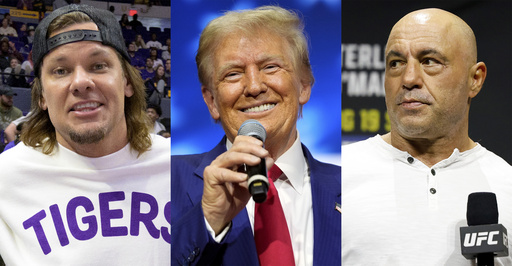
Did stand-up comedians play a role in securing Donald Trump’s reelection? While it may sound humorous at first, there appears to be merit in that question. For nearly a decade, Trump has been the target of numerous late-night shows and “Saturday Night Live” sketches, with many in Hollywood responding with disdain and mockery toward his political endeavors.
However, in the lead-up to the elections, Trump engaged with podcasting comedians, a group that is gaining prominence in shaping political discussions through a blend of humor, right-wing conspiracies, and playful derision of leftist ideologies. Seth Simons, a journalist specializing in the darker aspects of comedy, notes that these personalities often function not only as entertainers but also as influencers, pundits, and in some cases, propagandists with significant followings.
The Trump presidency has coincided with the rise of longer Netflix comedy specials and an increasing number of comedy podcasts. This scene reflects the nation’s diversity while some of its most talked-about figures have often taken swings at left-wing politics. Dave Chappelle has stirred contention with his jabs at transgender activists. Bill Burr openly critiques feminists, particularly during his “SNL” monologue after the elections, and Michelle Wolf, known for her pointed remarks at the 2018 White House Correspondents Dinner, continues to scrutinize the #MeToo movement in her 2022 special. While these comedians have not explicitly backed Trump, they have targeted what Trump’s campaign terms the “woke left,” an enemy figure in his rhetoric.
Trump’s foray into comedy podcasts marked a shift in his outreach strategy to younger male voters, a method reportedly advised by his son Barron. Data shows over half of male voters aged 18-44 supported Trump, with a significant portion backing Vice President Harris, though Biden ultimately won this demographic in 2020. Unlike the carefully curated political appearances typical on late-night shows, Trump’s discussions with comedians like Joe Rogan extended up to three hours, covering topics that ranged from false assertions about the 2020 election to far-out theories about UFOs and the assassination of John F. Kennedy. Even Rogan, who previously supported Bernie Sanders, endorsed Trump for this election cycle.
The comedians holding these conversations do not focus solely on politics; they also delve into topics like mixed martial arts and internet trends. Their discussions often reflect a skepticism of established norms and an advocacy for free speech, leading them to see Trump as a fellow nonconformist. Rogan, for instance, has pointedly remarked that being a “rebel” within today’s political landscape now aligns with Republican ideals, a perspective that has garnered a massive audience, as evidenced by his interviews accumulating millions of views.
Simons suggests that the relationship to these comedians who embrace controversial humor could shift comedy itself to a more right-leaning stance as audiences come to accept controversial jokes simply as entertainment. In the wake of Rogan’s interview with Trump, fellow comic Marc Maron expressed concern over comedians normalizing extremist viewpoints by mingling with figures who espouse far-right ideologies.
The media landscape has fractured significantly since the days of Johnny Carson, who, as the late-night titan, avoided political controversy to maintain broad appeal. Nowadays, left-oriented comedy hosts often deliver politically charged monologues, making them indistinguishable from political commentators. Comedian Wayne Federman pointed out that the limited audience reach of current late-night shows has fostered the growth of alternative platforms like podcasts, to which Rogan has successfully tapped into.
Trump’s podcast engagements could also indicate a deeper influence of stand-up’s evolution on his speech patterns. His off-the-cuff delivery style, which he himself has labeled as “the weave,” showcases a combination of seemingly random anecdotes and pop culture references, reminiscent of stand-up routines. This has raised questions about whether his comments are proposals or mere jokes, complicating the narrative for journalists covering his speeches.
Despite moments when jokes fell flat, including a misstep from comedian Tony Hinchcliffe where he made derogatory remarks about Puerto Rico at a Trump rally, the campaign distanced itself from the fallout. In a couple of events later, however, Trump managed to deliver some acutely humorous remarks that resonated with audiences.
In the complex interplay between politics and comedy, the relationship between stand-up and Trump’s political endeavors continues to warrant examination as both fields evolve within a shared cultural framework.
